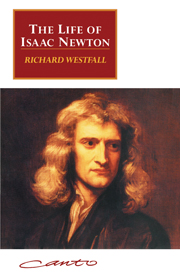Book contents
- Frontmatter
- Dedication
- Contents
- Preface
- Acknowledgments
- A Note About Dates
- Plates
- 1 A Sober, Silent, Thinking Lad
- 2 The Solitary Scholar
- 3 Anni Mirabiles
- 4 Lucasian Professor
- 5 Publication and Crisis
- 6 Rebellion
- 7 Years of Silence
- 8 Principia
- 9 Revolution
- 10 The Mint
- 11 President of the Royal Society
- 12 The Priority Dispute
- 13 Years of Decline
- Bibliographical Essay
- Index
1 - A Sober, Silent, Thinking Lad
Published online by Cambridge University Press: 05 September 2013
- Frontmatter
- Dedication
- Contents
- Preface
- Acknowledgments
- A Note About Dates
- Plates
- 1 A Sober, Silent, Thinking Lad
- 2 The Solitary Scholar
- 3 Anni Mirabiles
- 4 Lucasian Professor
- 5 Publication and Crisis
- 6 Rebellion
- 7 Years of Silence
- 8 Principia
- 9 Revolution
- 10 The Mint
- 11 President of the Royal Society
- 12 The Priority Dispute
- 13 Years of Decline
- Bibliographical Essay
- Index
Summary
ISAAC NEWTON was born early on Christmas Day 1642, in the manor house of Woolsthorpe near the village of Colsterworth, seven miles south of Grantham in Lincolnshire. Because Galileo, on whose discoveries much of Newton's own career in science would squarely rest, had died that year, a significance attaches itself to 1642. I am far from the first to note it – and undoubtedly will be far from the last. Born in 1564, Galileo had lived nearly to the age of eighty. Newton would live nearly to the age of eighty-five. Between them they virtually spanned the entire Scientific Revolution, the central core of which their combined work constituted. In fact, only England's stiff-necked Protestantism permitted the chronological liaison. Because it considered that popery had fatally contaminated the Gregorian calendar, England was ten days out of phase with the Continent, where it was 4 January 1643 the day Newton was born. We can sacrifice the symbol without losing anything of substance. It matters only that he was born and at such a time that he could utilize the work of Galileo and of other pioneers of modern science such as Kepler (who had been dead twelve years) and Descartes (who was still alive and active in the Netherlands).
- Type
- Chapter
- Information
- The Life of Isaac Newton , pp. 1 - 18Publisher: Cambridge University PressPrint publication year: 1994

